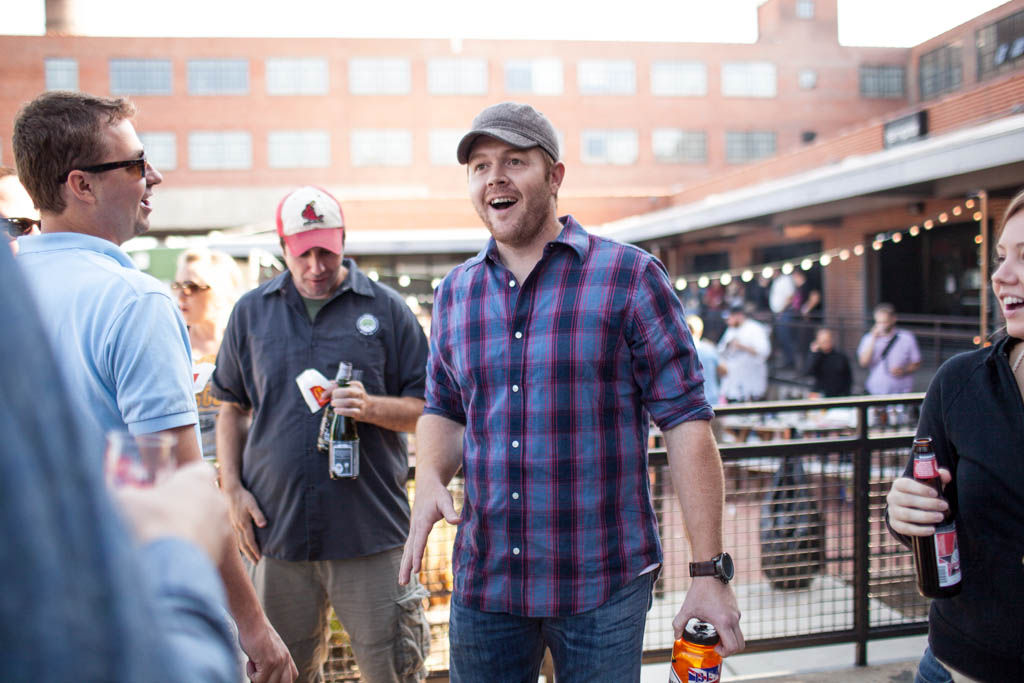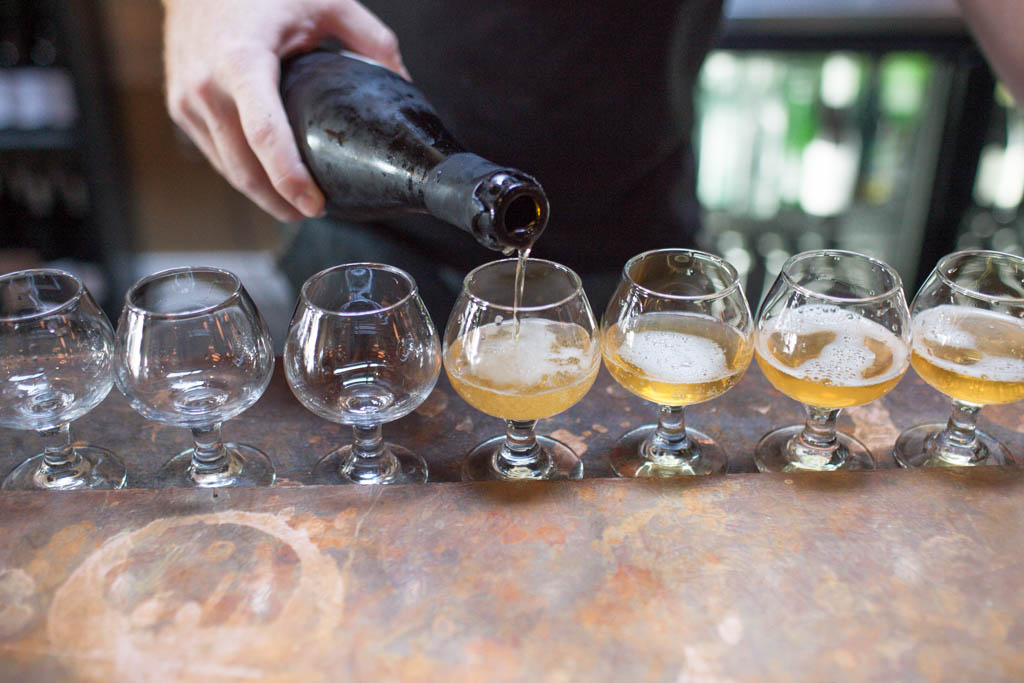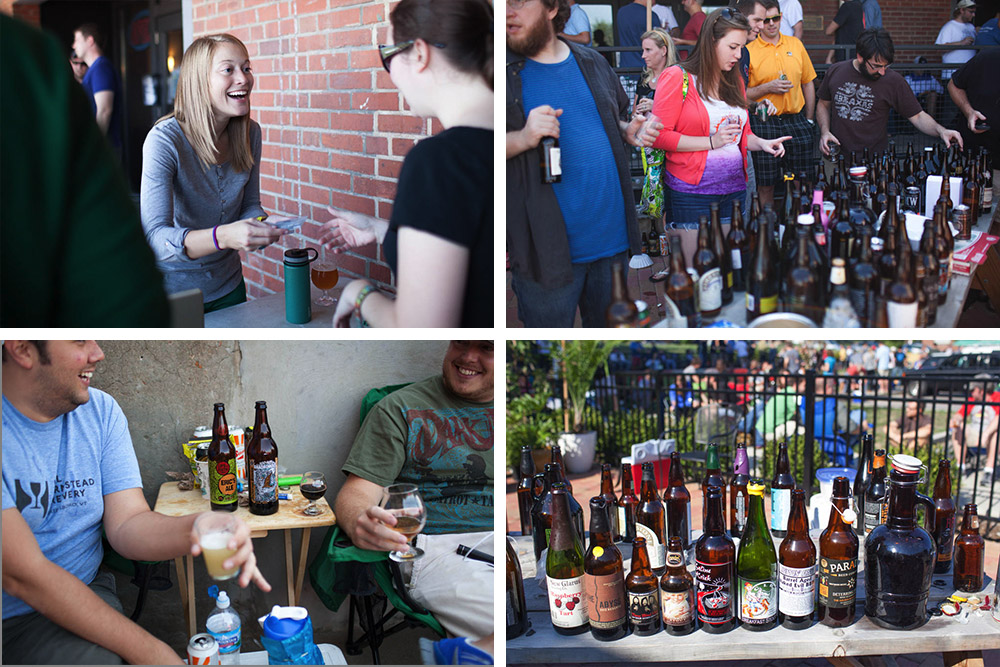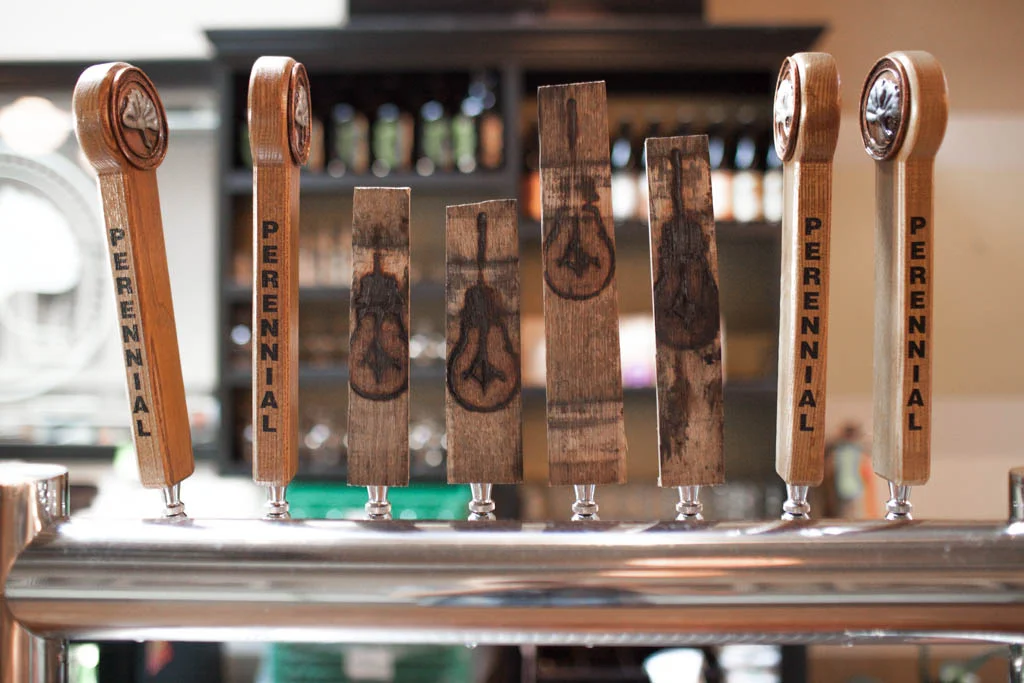Cory King of Side Project Brewing is part of a curious new generation of American brewers. He's focused on mastery, not markets. Yeast strains more than hops. And blending as much as brewing. And he can do all this because Side Project is exactly that — an internal start-up at Perennial Artisan Ales in St. Louis, where King also serves as head brewer.
King was Perennial’s first hire. Owner Phil Wymore, himself a former Goose Island and Half Acre employee, had launched a small, unassuming brand in a former Coca-Cola bottling plant on St. Louis’ southwest side, just down Interstate 55 from Anheuser-Busch along the Mississippi River. Focused on small-batch seasonals, many of which are Belgian-inspired, Perennial’s format is the kind of brewery that want-to-be brewers across the nation pine for. King was no exception.
"I read an article while I was managing the International Tap House here in St. Louis. I’d have hours free in the morning and I’d just read beer stuff — keep up with everything new. I read an article from Chicago about the former cellar and head manager from Half Acre coming to St Louis to start a brewery. I Googled his name, and found ways to contact him. I Facebooked him and said 'I want to work for you.' Not just because he was a brewer but because he was doing what I wanted to do — Belgian-inspired, barrel aging, unique beers, techniques and procedures that were different. His first question was 'why not any other brewery in St. Louis?' The truth is, I was just picky.”
King’s first batch was Hommelbier, a dry-hopped Belgian pale ale with a slightly malty finish and plenty of earthy, spicy notes and a dry citrus aroma. For someone with no professional brewing background, you might think this was an ambitious recipe for a first mash. But the way Perennial was built was familiar to King.
“It’s just an 8.5 barrel system and it's old. Very old. A precursor to the precor stainless set-ups. Everything’s manual with valves all over the place. My home-brew system was kind of and intermediate version of this. I had the process down. I knew the technique. And my background was chemsity and building cars, all mechanical. When it comes to fixing things, stuff like this just makes sense to me. So from day one, as long as I had every valve shut before I changed something, I couldn’t mess up. I caught on really quick. Now, if I walked into New Belgium and had to learn all the software or something, where it’s all computers, I can’t do that.”
Perennial has already surpassed it’s five-year projections, largely due to the exposure they got from their 750ml bottles in places like Chicago, Philadelphia and D.C. where the craft business has helped create a customer that’s willing to pay more for new, interesting flavors and larger formats. “We had distributors asking us to send them beer," King said. "We don’t fit everywhere with our price points, so we respectively decline. We don’t want stuff sitting on the shelves. But in places where it moves, we just figure we’ll brew more than we planned. Even in Missouri we move, despite being expensive by comparison to many other brands.”
On the back of all that success, most brewers would be happy to catch their breath. But like so many amateurs-gone-pro, it’s the thrill of the next recipe that drives King. Producing Hommelbier, or any other the widely-applauded Perennial Ales, can only bring so much satisfaction — they’re only new once for King. "I have the attention span of a child. But when it comes to brewing, you grow your skill by brewing more and more batches of the same thing. That’s just not my forte. I need the stimulation and the challenge of new beers all the time.” Perennial has been prolific by any standards, introducing ambitious beers like Heart of Gold, Abraxas, and Peach Berliner Weiss in the past year. So when King says he needs stimulation, he’s talking about an extreme need to go further, into an area of brewing where business viability is challenging, to say the least.
King’s owned his own business before. He even has a master's degree in business. So he’s not naive to the constraints and goals of commerce. And before he ever set his eye on Perennial, he’d put together a business plan for a brewpub in St. Louis himself. But having to rely on chefs and a staff, start-up costs, and not having the operational experience kept it on the back burner. So he surprised himself when he was suddenly thinking of pursuing his own brewery less than a year into his time at Perennial. “It’s part of my personality to have my own thing. It’s always been an end-all goal. But I didn’t think Perennial was going to be a stepping stone. I thought I’d be here for a long, long time before I made the jump,” King said.
It was a trip to the Craft Brewers Conference that planted the seed in King’s mind — even if he didn’t realize it at the time.
“When I was out at CBC, I was talking to suppliers and asking questions about tanks, how much they cost. General questions. I didn’t realize asking these questions was a sales lead to them. One of them called and asked for Phil and said he had quotes for Cory’s brewhouse. I had a lot of explaining to do. I seriously wasn’t trying to leave at the time. I was honestly just asking questions. Phil laughed. He knew I had the drive. Maybe even more than I knew. I had the greatest brewing job in the country probably. We’re small. I get to do innovative things. And yet, here we were. Phil told me if I had any questions I could ask him — he was an open book. Half Acre did that for him, so he understood. So I just started asking questions and he helped me learn. I was a sponge.”
Four months later, with Perennial growing quickly, Wymore and his wife, Emily, pitched the plan for King to open his own brewery — inside Perennial. King ordered some barrels for what he referred to as his “side project” at the time. “Phil probably thought I’d have a few barrels to try some things. And now I have more than 100 barrels. He and I source them together now. We'll order them by the truck load and split shipping costs and whatnot. It’s become efficient for both of us.”
This past September, King opened “Side Project” to the public in an official capacity, throwing open the doors of Perennial's tasting room for the line snaking around the parking lot with a communal bottle share akin to a mini Dark Lord Day. King’s 100-percent barrel-aged, and mostly barrel fermented beers explore the outer edges of what Perennial is already doing — pushing yeast strains into new and interesting territory, elevating fruit flavors, and finding balance in unexpected places. Beers like Saison du Fermier, his chardonnay-barrel saison — “a weird cocktail of bugs and yeast, old-meets-new kind of beer” — is a batch to batch vintage for King, meaning replication will be nearly impossible. But that’s hardly the point.
At this years’ Festival of Barrel Aged Beers (FoBAB) in Chicago, King took the stage for both sides of the brewhouse. He won gold in the Wild Beer category with 35 entires for his Side Project Fuzzy, an American wild ale fermented in chardonnay with Missouri white peaches. “I picked them myself from Bakers Farm,” says King. “We met these awesome old ladies who wanted me to bring them some afterwards. They’ll probably hate it. But I’ll bring them some anyways. There’s all kinds of bugs and critters and my only ‘lab' is me tasting the beer. I don’t even know what all's in there since some of it’s spontaneous.” Perennial’s Barrel-Aged Abraxas also took a gold medal at FoBAB — an imperial stout aged for just over a year in rye barrels with cacao nibs, vanilla beans, ancho chiles and cinnamon sticks.
The relationship between Perennial and Side Project is a mutually beneficial one. Side Project takes advantage of free capacity and provides a way for King to keep experimenting. And every bottle release creates a draw in the Perennial tap room. It’s hardly competitive — Side Project released only fifteen barrels into the market last year. That’s right, fifteen. But for all intents and purposes, they treat it like a partnership.
“This year Perennial is looking for more space, and we’re looking at space together. Russ and Phil are so open about everything. They’re not funding it, but we’re working together. I’ll be brewing for Perennial for a really long time. One day maybe I'll have to split my salary because I’ll need more time for Side Project, but really it’s a means of taking a different approach. I come at it from a really old perspective of when you'd brew beer to feed your family, give to workers or barter with. And you can tell by the styles I’m making that it’s not even feasible to do 10,00 barrels and put it in oak. And I want to be the one brewing it. I didn’t start a brewery to sit at a desk and have other people brew my beer. I love to brew, and that’s the point. As long as I can support myself, keep the guys at Perennial happy, and do my thing, then it’s right."





















